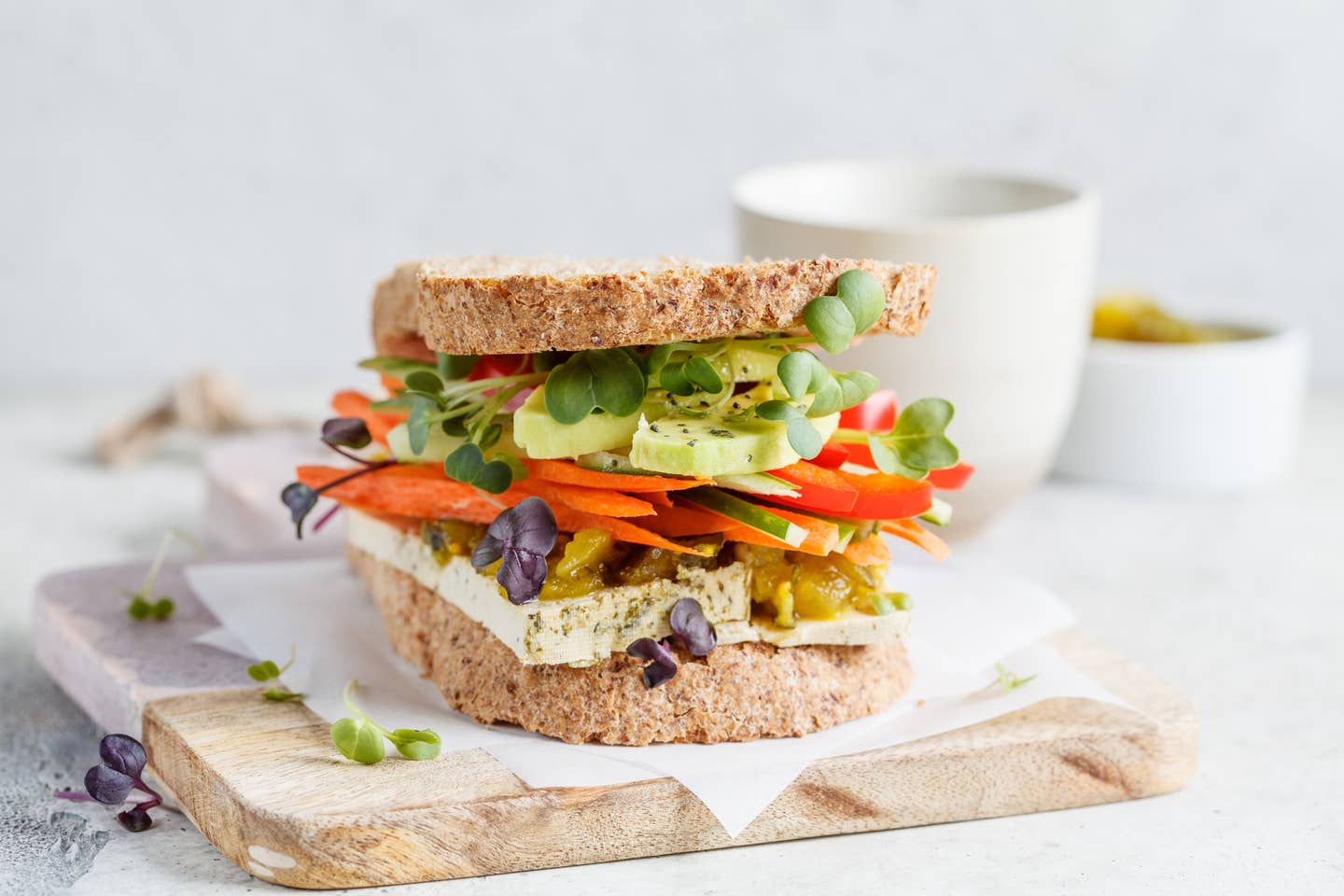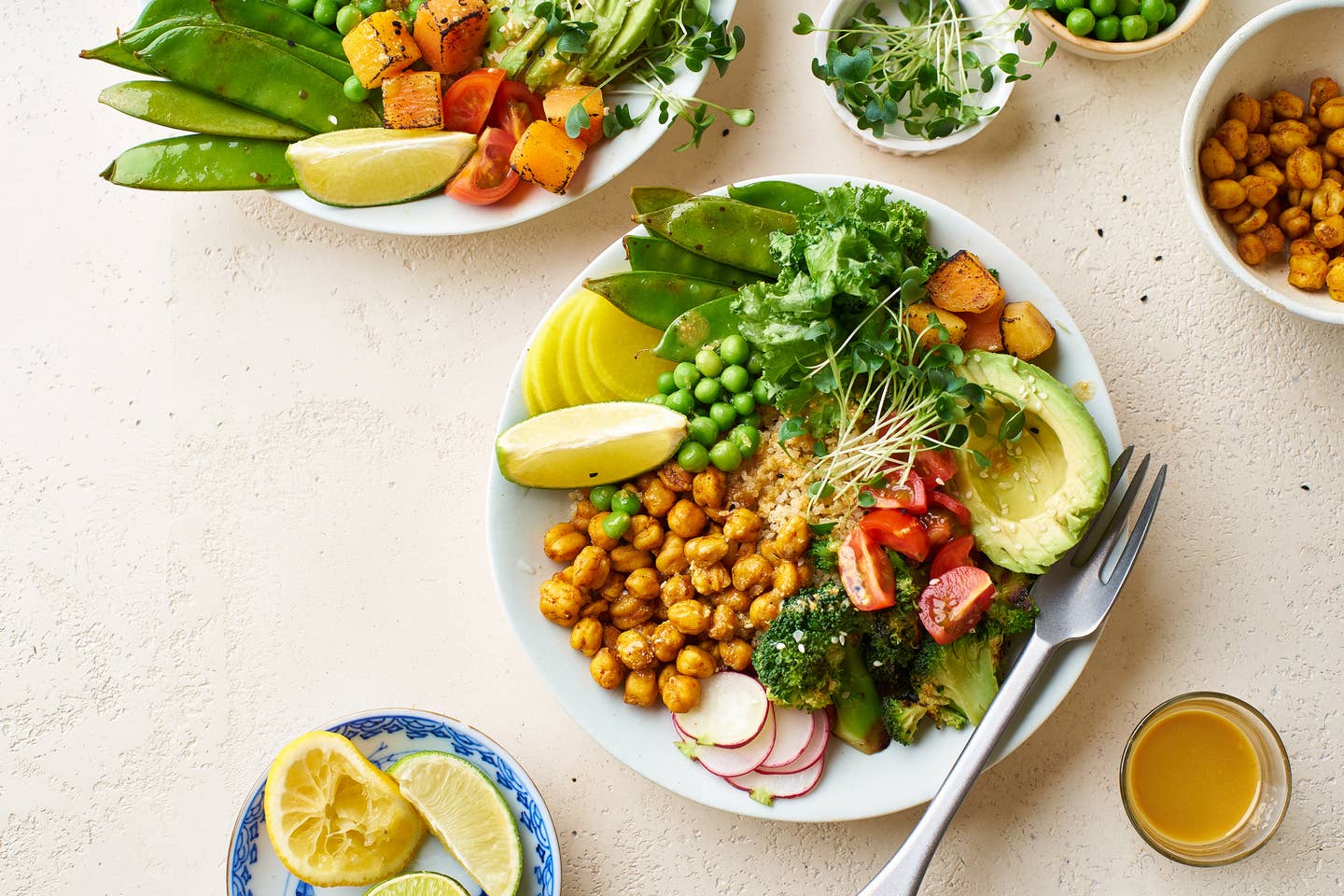
7 Superfoods to Add to Your Sandwich to Make It a Nutrition Powerhouse
If the word sandwich conjures up uninspiring slabs of bread housing equally dull leftovers, you’re approaching it all wrong. Using a few super-nutrient dense plant-based ingredients instead can convert an ordinary sandwich into a healthy meal, full of vitamins and antioxidants, filling fiber, and immune-boosting compounds, while still being a delight to your taste buds. Sandwiches can remind us that "nutritious" can be synonymous with "delicious."
Add any of these seven ingredients: Hummus, eggplant, mushrooms, onions, pickles, sprouts, and mustard will turn any regular Sammy into a virtual powerhouse of nutrition. Massachusetts-based Ryan D. Andrews, RD, Principal Nutritionist for Precision Nutrition says the best strategy is to mix it up and add healthy foods bursting in color.“Dietary variety is good for our health and the planet's health. People can get stuck in a rut and include the same two things [in their sandwhich] over and over. Rotate in colorful options to get more variety.”
Eating plant foods is beneficial for our health because it provides us with a variety of different nutrients. It starts with the bread (see number 7 for your best bet) and then every other layer in your stack, from the spread to the pickle, can give your lunch and your health a boost. Here are foods to add to your next lunch to make the meal work harder for you,
7 superfoods to add to your sandwich to make it a nutrition powerhouse
1. Hummus
In its most basic form, the dip includes chickpeas, tahini, and garlic, all great for you. “Chickpeas are full of different nutrients, vitamins, minerals, and protein fiber,” Andrews says. Numerous studies point to the health-promoting effects of legumes, and when study subjects swapped out red meat and instead ate chickpeas it help to control type 2 diabetes. Meanwhile, other studies show that a diet rich in legumes helps lower cholesterol and decreases the risk of cardiovascular disease. “People who consume more legumes tend to have a lower incidence of chronic disease risk," he adds, so however you can get more of them into your diet is a good idea.
Sesame seeds, the base of tahini, are full of heart-healthy fatty acids, protein, and offer health benefits that are tied to lowering the risk of certain cancers, according to research. One study found that the active ingredient, sesamin, protects your cells against what scientists call "stretch injuries" where the membrane is stretched and the cells die. Meanwhile, garlic has for centuries been known to strengthen immunity, and help the body fight off bacterial infections, as well as detoxify the body and rid it of poisons, even lead poisoning, according to research.
Best of all? “Hummus tastes good goes well with a lot of veggies on sandwiches,” Andrews says. “For most people, it's going to be a pretty healthy option.” One note: This is not a good choice for anyone on a low FODMAP diet.
2. Eggplant
Known as the “king of vegetables” egglplant is a winning addition to your stack, eventhough technically it’s a fruit. Regardless of what you call it, eggplant is a nutrient-dense food, providing vitamins and minerals as well as 3 grams of fiber per cup. In particular, the skin of eggplant provides polyphenol anthocyanin antioxidants, says Kelly Jones RD, founder of Student Athlete Nutrition, near Philadelphia.
“Eggplant may help protect DNA and more recently it has been found to be cardioprotective.” You’ll want to cook eggplant before adding it to your sandwich. Jones recommends sautéing cubed eggplant with garlic, olive or avocado oil and herbs. Besides using eggplant with the toppings listed here, “many people enjoy a sandwich made with breaded eggplant topped with marinara and plant-based cheese,” she says. But if you go that route, “keep it more nutritious with whole wheat breadcrumbs and lighter by baking rather than frying,” she says.
3. Mushrooms
Mushrooms are another powerfully nutritious sandwich topping. “Mushrooms provide the important antioxidant selenium, which helps the body neutralize free radicals,” says Jones. Every variety of mushrooms available appear to offer different phytochemical antioxidants and therefore added benefits, she adds, which makes a mushroom mixture (including Reishi, Turkey Tail and Maitake) a great way to boost immunity. Researchers have even studied the immunological power of 5 major mushrooms to improve survival among cancer patients.
As if that weren't enough, certain mushrooms like cordyceps, for example, offer adaptogens, or compounds that may help the body's responses to stress. Finally, when mushrooms are UV-treated, they are also a good source of vitamin D, which is an essential vitamin most Americans are deficient in.
4. Onions
Onions are a good source of vitamin C and also support immune health as well as the microbiome, Jones says. While antibacterial properties have been noted for decades, a recent study even investigated onions how onions’ antibacterial properties compared with antibiotics’. When it comes to supporting your gut health, and specifically the microbiome "onions have a strong prebiotic component which supports good gut bacteria – which impacts everything from immune health to mood,” Jones says.
One caveat: “Onions may be problematic for those with IBS who respond well to low FODMAP diets. However, if you enjoy the flavor, you can sautée in oil, remove the onion and utilize that oil to cook other foods or drizzle it in your sandwich for the flavor benefit.”
5. Pickles
Fermented pickles can feed the gut microbiome and help grow healthy gut bacteria that reduces inflammation and bolsters a host of other healthy proccessees in the body. But check your pickle jar, Andrews warns, since not all pickles are cultured or fermented. “Including some fermented foods in the diet can help to support overall gut health, which has all these different beneficial effects throughout the body.”
Find fermented pickles in the refrigerated section of your grocery store. Most pickles are not fermented but instead made by adding vinegar and salt. In either case, pickles are high in sodium, so if you’re sensitive to salt overload, you may want to limit your intake, he says. As for the fermented variety, know that fermented foods contain tyramine, and migraine sufferers and those on certain medications can be sensitive.
6. Mustard
What we commonly refer to as “mustard” is the condiment made from mustard seeds, vinegar and a few other spices or ingredients. Mustard seeds have a number of benefits, including anti-inflammatory properties. Mustard typically contains turmeric. “Mustard is the delivery system for turmericin America” says Andrews. Turmeric contains curcumin. Mustard is low in calories, and offers a smattering of nutrients, such as calcium, phosphorus and selenium. As with pickles, mustard can be high in sodium, so just be aware of how much you’re adding to your sandwich if that’s of concern.
7. Sprouts and Sprouted Bread
The best bet for any sandwich is to start with bread made with sprouted grains such as Ezekiel bread, which is a sprouted bread made from whole grains and legumes that have started germinating or sprouting.
Adding sprouts to your sandwich is another healthy way to include powerful nutrients in every bite. Sprouts offer a number of health benefits and can contribute to a healthy weight, well-managed blood sugar, and a healthy gut. Since sprouts carry a higher risk of contamination as compared with a lot of other foods, be sure to look for sprouts from reputable sellers, and be sure to understand whether you should stay away from them, for example, if you are pregnant.
Sprouts also reduce the potency of "antinutrients" which are the phytochemicals plants produce to discourage animals, including humans, from eating them. Antinutrients lower the absorption of other nutrients in the digestive system. Sprouting or fermenting or soaking all work to deactivate these antinutrients in foods like legumes and increase the nutrient value of the food you eat.
Bottom Line: Make your sandwich into a nutrition powerhouse by adding superfoods
The old drab fillings no longer do it when it comes to a sandwich. Start with sprouted bread, then add these other superfoods to your stack to turn yesterday's leftovers into a health-food powerhouse.
More From The Beet






